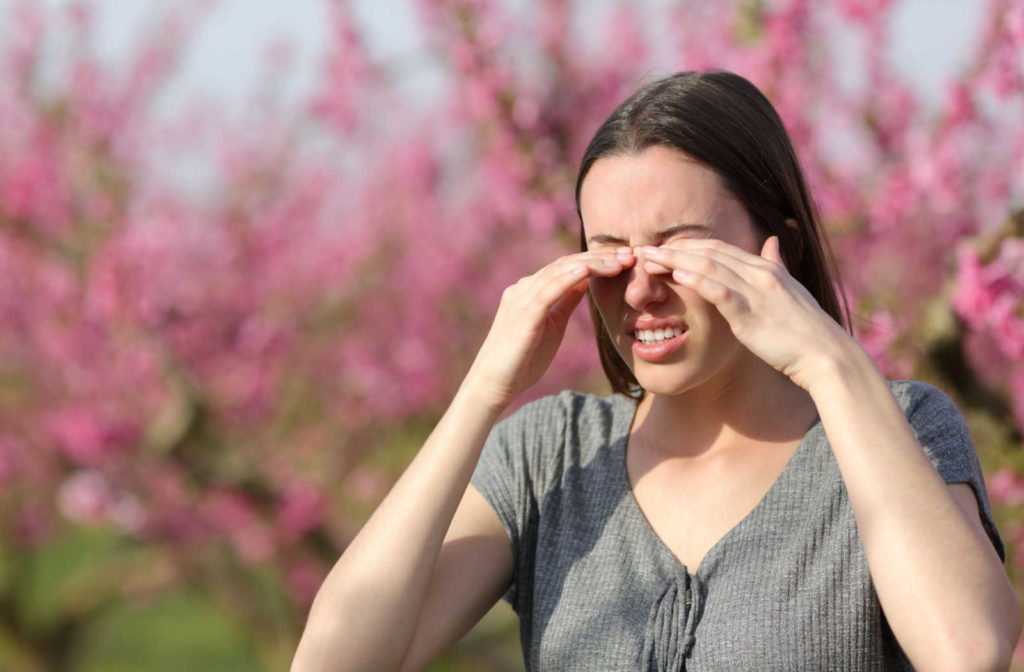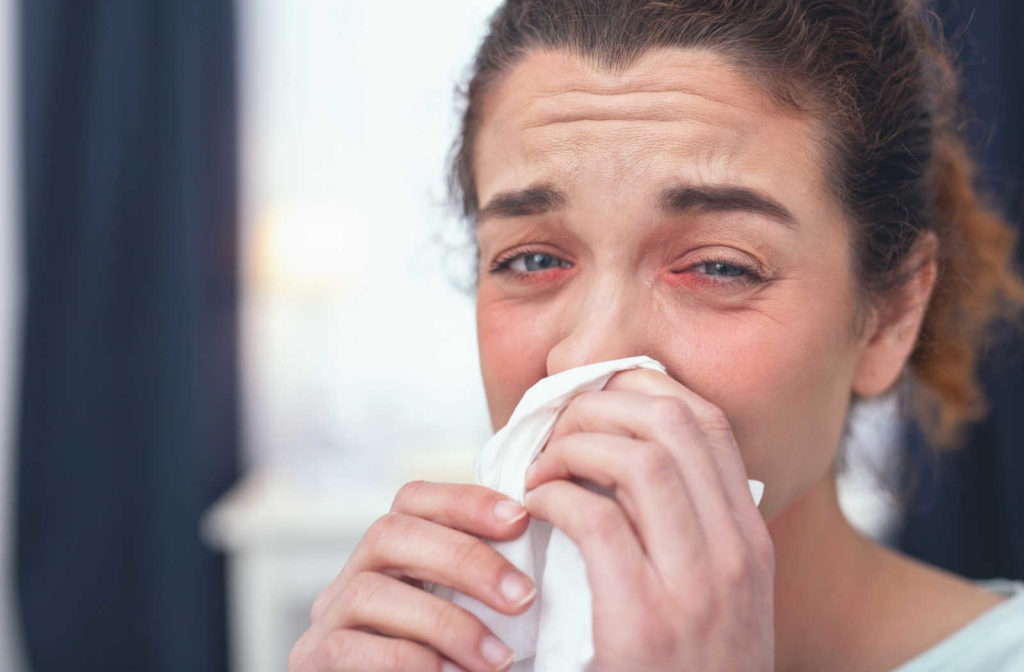Do you have irritated sore eyes? Eye conditions such as viral or bacterial infections, allergies and dry eye can have similar symptoms. You should see your eye doctor to get a diagnosis and proper treatment for those itchy, red eyes. For this reason, there isn’t really a one-size-fits-all answer for treating dry eye syndrome.
This article briefly overviews dry eye, its common symptoms, and several causes. It also goes through some treatment or symptom management techniques specific to allergy-induced dry eyes.
What Is Dry Eye?
Dry Eye results when your tear system fails to protect your eye surface from desiccation or drying stresses in our everyday life like our environment, health conditions, and medications. This eye condition is caused in two major ways: inadequate tear production or tear quality that results in premature evaporation. Sometimes both of these causes may be at play. Effectively the system is derailed and we need to do a factory reset to get back to its normal protective function
Symptoms of Dry Eye
There are a whole range of symptoms that can accompany dry eye. In fact, the treatment of the condition typically revolves around managing these symptoms.
The symptoms of dry eye may vary depending on what’s causing it, but they include the following:
- Red or bloodshot eyes
- Feeling like there is something in your eye
- Itchy eyes
- Sensitivity to light
- Mucus discharge
- Watery eyes (even though this seems contradictory)
- Inability or difficulty in wearing contact lenses
- Blurry vision
- Tired eyes
- Struggling with low light and nighttime vision
Causes of Dry Eye
As mentioned, there are two primary causes of dry eye.
Decreased Tear Production
In addition to lubricating the eyes, your tears are responsible for creating a thin protective layer over the eye’s surface. If you’re not producing enough tears, you’ll likely begin experiencing some of the uncomfortable symptoms listed above.
Some common factors that contribute to inadequate tear production include:
- Age
- Underlying medical conditions, such as Sjorgen’s syndrome, autoimmune disorders, vitamin A deficiency, or allergic eye disease.
- Medications including antihistamines, antidepressants, acne, birth control, or decongestants.
Premature Tear Evaporation
On the other hand, your eyes may produce enough tears. But if they evaporate too quickly, they won’t do their job correctly. One of the primary reasons for this evaporation is a lack of oil in the tear mixture.
Some common factors that contribute to premature tear evaporation include:
- Eye allergies
- Meibomian gland dysfunction (MGD)
- Inadequate blinking
- Eye drop preservatives
- Environmental elements like wind, dry air, or smoke

Can Allergies Cause Dry Eyes?
Chronic inflammation from allergies and allergy medications can worsen both types of dry eye. Let’s look at several types of eye allergies that may result in these uncomfortable symptoms.
Seasonal Allergic Conjunctivitis
This type of dry eye is typically caused by environmental factors. These can change throughout the year, which is why they are called seasonal allergies. Burning, itchy, red, and watery eyes are all common dry eye symptoms that you could experience from this allergic reaction.
Vernal and Atopic Keratoconjunctivitis
These types of allergies are typically more severe than seasonal, even though they often get worse at particular times throughout the year. Vernal and atopic keratoconjunctivitis is most common in males dealing with eczema or asthma.
The dry eye symptoms you could experience are feeling like something is in the eye, sensitivity to light, and mucus discharge from the eyes.
Contact Allergic and Giant Papillary Conjunctivitis
These allergic reactions generally happen when the eye comes into contact with something. A contaminated contact lens is one great example. Itchy, red eyes with a mucus discharge are common symptoms. Other symptoms include blurry vision or feeling like something is in the eye.
Treating Allergy Caused Dry Eye
When dealing with allergies, the first thing many people jump to is over-the-counter (OTC) allergy medicine, like an oral antihistamine. The problem with these medications is that most can actually cause or worsen dry eyes.
Some other things you can do to minimize the risk of eye allergies include:
- Wear eyeglasses instead of contact lenses
- Ensure your hands are cleaned properly before touching your face
- Close windows, especially during high pollen times
- Wear sunglasses to cut back on pollen in your eyes
- Take a shower (or at least wash your face) after being exposed to allergens
- Eye drops (OTC or prescription, in some cases)
Talk to Your Optometrist About Treating Your Dry Eyes
In many cases, an OTC lubricating eye drop is sufficient to alleviate the symptoms of dry eyes. But there are times when further treatment is necessary. Through a comprehensive eye exam, the optometrist can determine if there is an underlying cause, like allergies causing your symptoms. Give us a call, and the professional staff here at In Focus Eyecare can answer your questions and book you in to see one of our optometrists.





